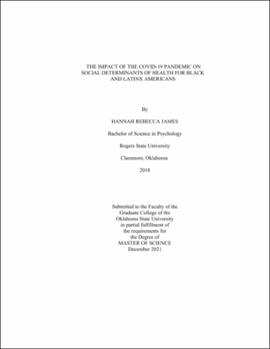| dc.contributor.advisor | Stout, Mike | |
| dc.contributor.author | James, Hannah Rebecca | |
| dc.date.accessioned | 2022-05-13T19:05:12Z | |
| dc.date.available | 2022-05-13T19:05:12Z | |
| dc.date.issued | 2021-12 | |
| dc.identifier.uri | https://hdl.handle.net/11244/335766 | |
| dc.description.abstract | The ongoing COVID-19 pandemic has exacerbated disparities in social determinants of health and highlighted pre-existing health inequities that have resulted in higher rates of COVID-19 morbidity and mortality among black and Latinx Americans. In this thesis, Bronfenbrenner's bioecological model is used to show how social determinants of health such as food security, economic security, housing security, and healthcare access influence one another and overall health status (Bronfenbrenner & Morris, 2006). The purpose of this study was to explore associations between race, ethnicity, and poorer pandemic outcomes in social determinants of health measures and overall health status. The sample for this study (n=2,813,359) was a nationally representative sample recruited by the U.S. Census Bureau using the Master Address File (MAF) for the Household Pulse Survey (HPS). The HPS was created to measure social and economic effects and various household experiences during the COVID-19 pandemic. HPS questions were used to examine how four social determinants of health varied between racial and ethnic groups throughout the pandemic: food security, economic security, housing security, and healthcare access. Additional measures were used to assess overall health status: COVID-19 diagnosis and self-reported health status. Chi-square analyses were used to measure associations between race and ethnicity and study variables. Significant associations were followed up with Cramer's V tests to measure the effect size of associations. Study findings show that black and Latinx Americans experienced disproportionate rates of food insecurity and housing insecurity. While black and Latinx respondents reported lower rates of insurance coverage, higher rates of deferred mental health services, greater rates of COVID-19 diagnosis, and poorer overall health status when compared to white and non-Latinx respondents, Cramer's V tests showed no association between race and ethnicity these health variables. Results suggest historical disparities in social determinants of health may be driving the health inequities seen in COVID-19 health outcomes across racial and ethnic lines. Further research is needed to fully understand the impact of the COVID-19 pandemic on social determinants of health for populations of color. Swift intervention is necessary to prevent future health disparities that result from these increasing inequities. | |
| dc.format | application/pdf | |
| dc.language | en_US | |
| dc.rights | Copyright is held by the author who has granted the Oklahoma State University Library the non-exclusive right to share this material in its institutional repository. Contact Digital Library Services at lib-dls@okstate.edu or 405-744-9161 for the permission policy on the use, reproduction or distribution of this material. | |
| dc.title | Impact of the COVID-19 pandemic on social determinants of health for Black and Latinx Americans | |
| dc.contributor.committeeMember | Moore, Tami | |
| dc.contributor.committeeMember | Bailey, Whitney | |
| osu.filename | James_okstate_0664M_17481.pdf | |
| osu.accesstype | Open Access | |
| dc.type.genre | Thesis | |
| dc.type.material | Text | |
| dc.subject.keywords | covid-19 | |
| dc.subject.keywords | racial and ethnic disparities | |
| dc.subject.keywords | social determinants of health | |
| thesis.degree.discipline | Human Development and Family Science | |
| thesis.degree.grantor | Oklahoma State University | |
